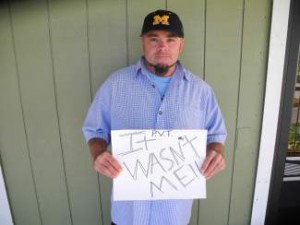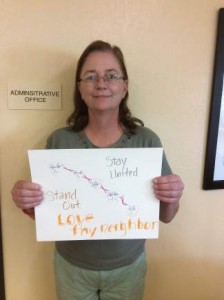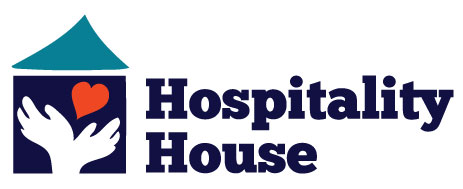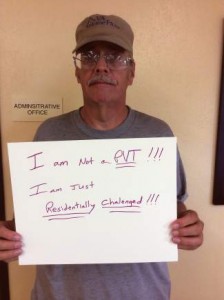Challenging Labels
In September, the Nevada County Board of Supervisors and the Grass Valley City Council will have to respond to the civil grand jury’s June report, “Panhandlers, vagrants and transients in a neighborhood near you?”
But well before that response was due, the language used in the report drew criticism.
The report used the phrase “panhandlers, vagrants and transients” so frequently the authors coined an acronym — PVT. The term appears 38 times in the 11-page report.
A number of individuals interviewed for this article said they preferred to be called “houseless” or “displaced residents.” Others think “homeless” is more or less the right word. But the grand jury’s term of “PVT” generated strong emotional responses for some.
Days after that report was released, Hospitality House hosted a healing workshop for some of its residents. As part of the nonprofit’s mission to shelter Nevada County’s homeless and help them find housing, the workshop was an effort to help participants address some of the root causes of homelessness.
“It’s heartbreaking, really. It doesn’t surprise me, but at the same time, it’s very disheartening. There’s obviously no compassion, none whatsoever. It’s a lazy mind, and it’s discrimination.” 
Ray
a homeless resident of Nevada City
“We’re trying to empower them to help them to heal, but you can imagine what it must feel like to be a homeless person when a report such as the one (the grand jury) wrote was released,” said Cindy Maple, executive director at Hospitality House. “It was really hurtful to them.”
Hospitality House sometimes uses poster-board and markers as tools in those workshops. The idea, Maple said, is to help its clients rethink how they see themselves, using “power words.” Several participants focused on the grand jury’s acronym, PVT.
“We were sending messages back to the community as a healing exercise, and they were so meaningful that we took pictures,” Maple said.
Robert Marquardt is a homeless veteran of the United States Army. He made a sign saying “I am not a PVT. I’m just residentially challenged.”
Marquardt worked in security for more than 15 years, and later found work as a trucker. He’s currently unemployed, but looking for work and making use of the services Hospitality House provides.
He said he doesn’t want to be called a PVT.
“It does offend me,” Marquardt said. “I’m not a panhandler. I’ve never stood on a corner with a street sign begging for money.
“I’m out there trying. It’s not like I’m sitting back on my butt doing nothing. I’m trying to get something done, and to be lumped in with people who don’t want to do anything is just frustrating,” he said.
“I don’t know who’s on the grand jury, but I’m sure that they’ve never actually gotten out and talked to people who are homeless,” Marquardt said.
Laurie, another Hospitality House resident who asked to have her last name omitted, criticized the lack of evidence in the grand jury report’s list of facts.
“I just don’t appreciate that the grand jury is assuming and relying on … numbers that are maybe, not exaggerated, but guessed at,” Laurie said. “They don’t have hard facts that the homeless are actually part of that problem.
“I think the grand jury went a little over the line in trying to describe this problem, quantify it and pin it down,” she added.
Tim Robison, another Hospitality House client, said he was outraged at the grand jury’s choice in language. In response, Robison made a sign saying, “P.V.T. — It wasn’t me.” He’s a contractor, and he used to run his own business. Robison said he owned a home in Roseville, but lost it in a recent divorce. That’s how he ended up at Hospitality House.
“There’s people in here that are school teachers that are out of work. There’s people in here that are nurses that are out of work. I’ve seen a few bad apples. That’s not anybody in here, but we’re being classified with those people, too,” Robison said.
Similar sentiments were expressed at a free weekly lunch in Pioneer Park, provided by Sierra Roots.
“It’s heartbreaking, really,” said Ray, a homeless resident of Nevada City who asked to be identified by first name only. “It doesn’t surprise me, but at the same time, it’s very disheartening. There’s obviously no compassion, none whatsoever. It’s a lazy mind, and it’s discrimination.”
Most of the homeless people interviewed for this story agreed that the individuals who make up Nevada County’s homeless population should not be lumped into a single category.
And members of the Nevada County Civil grand jury might agree with that.
“The Nevada County grand jury recognizes that any discussion of the homeless problem is politically challenging. There is a fine line between providing needed services to a deserving population and enabling or encouraging the less desirable element,” members of the grand jury wrote.
But many of the individuals with behavioral issues actually have homes, according to Michael Lucas Butler, and most homeless people wouldn’t even understand the term “PVT.”
Butler lives in unincorporated Nevada County, where he camps with the property owner’s permission. He moved here in 1993, and has been without permanent housing since 2003.
Butler sees the grand jury’s report on PVTs as a mild embarrassment, but said there’s a silver lining. He hopes it gives them a reason to re-examine their work, and possibly revisit this issue at a later date.
“Now that they’ve made themselves look a little foolish, this gives them the opportunity to come up and shine like a star,” Butler said.
Among the homeless individuals interviewed for this report, there was a consensus that the solution to problems associated with the homeless community would involve more access to mental health services.
They also tend to agree that there are dangerous, obnoxious or “less desirable” elements within the homeless community that do cause serious problems.
But several homeless individuals interviewed also stated that this is a national issue. It’s much worse outside of Nevada County, they said, and the extent of the problem locally may have been exaggerated.
“I know what panhandling means, and I’ve seen very little of it here,” said Laurie at Hospitality House. “What’s happening here is not as big a problem as I’ve seen recently in other places.”
To contact Staff Writer Dave Brooksher, email dbrooksher@theunion.com or call 530-477-4230.

